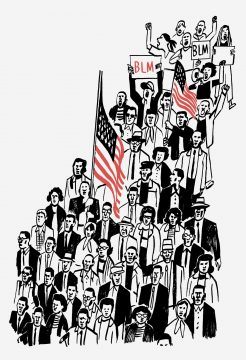David Remnick in The New Yorker:
 John Robert Lewis was born in 1940 near the Black Belt town of Troy, Alabama. His parents were sharecroppers, and he grew up spending Sundays with a great-grandfather who was born into slavery, and hearing about the lynchings of Black men and women that were still a commonplace in the region. When Lewis was a few months old, the manager of a chicken farm named Jesse Thornton was lynched about twenty miles down the road, in the town of Luverne. His offense was referring to a police officer by his first name, not as “Mister.” A mob pursued Thornton, stoned and shot him, then dumped his body in a swamp; it was found, a week later, surrounded by vultures.
John Robert Lewis was born in 1940 near the Black Belt town of Troy, Alabama. His parents were sharecroppers, and he grew up spending Sundays with a great-grandfather who was born into slavery, and hearing about the lynchings of Black men and women that were still a commonplace in the region. When Lewis was a few months old, the manager of a chicken farm named Jesse Thornton was lynched about twenty miles down the road, in the town of Luverne. His offense was referring to a police officer by his first name, not as “Mister.” A mob pursued Thornton, stoned and shot him, then dumped his body in a swamp; it was found, a week later, surrounded by vultures.
These stories, and the realities of Jim Crow-era segregation, prompted Lewis to become an American dissident. Steeped in the teachings of his church and the radio sermons of Martin Luther King, Jr., he left home for Nashville, to study theology and the tactics of nonviolent resistance. King teased him as “the boy from Troy,” the youngest face at the forefront of the movement. In a long career as an activist, Lewis was arrested forty-five times and beaten repeatedly by the police and by white supremacists, most famously in Selma, on March 7, 1965—Bloody Sunday—when he helped lead six hundred people marching for voting rights. After they had peacefully crossed a bridge, Alabama troopers attacked, using tear gas, clubs, and bullwhips. Within moments of their charge, Lewis lay unconscious, his skull fractured. He later said, “I thought I was going to die.
Too often in this country, seeming progress is derailed, reversed, or overwhelmed. Bloody Sunday led directly to the passage of the Voting Rights Act––and yet suppressing the Black vote is a pillar of today’s Republican Party strategy. The election of the first African-American President was followed by a bigot running for election, and now reëlection, on a platform of racism and resentment.
More here.
